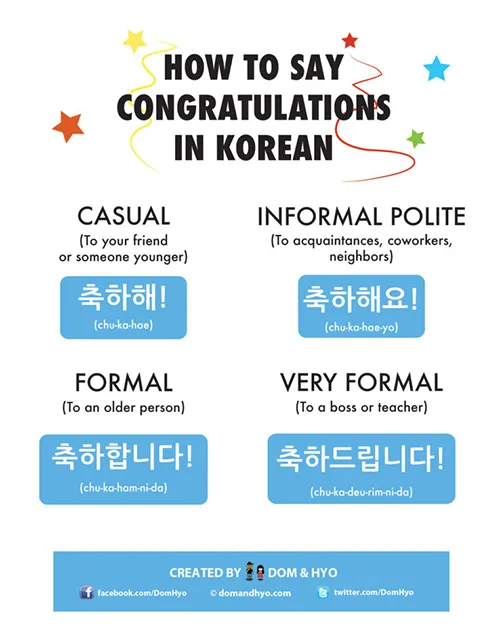
If you have Korean friends, acquaintances, or if you are/will be spending a decent amount of time in Korea, then this will be a handy phrase to know. You will eventually want to congratulate someone on their graduation, a birthday, wedding, etc. Like most places, these milestones are a big deal and people like to go out for delicious dinners, have fun parties, and share it with just a few close people (my personal favorite). Notice that there are four ways to say congratulations depending on who you’re talking to. *side note: don’t use Google Translate for this as it will turn out something completely different and you will sound weird if you use it!*
‘Congratulations’ in the Casual/Informal Form
For the casual/informal form, you will simply say 축하해!. Notice that the ‘요’ is dropped as usual for the casual form. You would say this to very close friends, children, and someone younger than you (if you’ve had their permission to use the casual form). This is especially used when celebrating birthdays.
‘Congratulations’ in the Standard Polite Informal Form
The second one is 축하해요! The 요 has been added on and you would say this to acquaintances, not-so-close friends, coworkers, and neighbors. However, you can use the next form as well if it’s a formal occasion.
‘Congratulations’ in the Formal Form
With the formal form, you would use 축하합니다! Use this with people older than you. You would also use this to congratulate someone on their wedding or graduation.
‘Congratulations’ in the Very Formal Form
For the very formal form, you would use 축하드립니다! Use this with bosses, teachers, or in general people with positions of power over you in the workplace. There are some variations with these. For example with weddings, you can use 축하드려요 which is a more casual form of 축하드립니다 while still being formal.
For example 결혼 축하드려요! (결혼 = wedding). You can just replace ‘결혼’ with another special occasion to change the meaning of your congratulations. For close friends, you can simply use the Polite informal form for most situations.
*Don’t forget to check out our ebooks and worksheets.*
Other vocabulary:
결혼 = Wedding
졸업 = Graduation
생일 = Birthday
P.S. Here are 6 example sentences to get more of a feel for this phrase. Happy learning!
제임스, 생일 정말 축하해요. (je-im-seu saeng-il jeong-mal chuk-ha-hae-yo) = James, I wish you a very happy birthday.
75번째 생일을 축하해요! (chil-ship-beon-jjae saeng-il-eul chuk-ha-hae-yo) = Happy 75th anniversary!
출산을 축하합니다! (chul-san-eul chuk-ha-ham-ni-da) = Congratulations on your new baby!
성공을 축하합니다! (seong-gong-eul chuk-ha-ham-ni-da) = Congratulations on your success!
진심으로 축하드립니다. (jin-shim-eu-ro chuk-ha-deu-lini-da) = Congratulations from the bottom of my heart.
방금 소식 들었습니다. 축하드려요! (bang-geum so-shik deul-eo-sseum-ni-da) = I heard the news just now. Congratulations.
